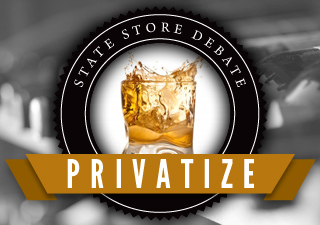Media
Happy Hour or Last Call? What’s the Scoop on HB 11

Ready to toast to an end of the state-run monopoly on wine and spirits? Nearly seven out of 10 Pennsylvanians would raise their glasses with you. Government-sold booze is a hot discussion across the commonwealth this week, but it’s not time to pour the champagne just yet.
Last Monday, House Majority Leader Mike Turzai introduced an amendment to restore House Bill 11 to its original intent, liquor store privatization. Here’s a look at what’s inside Rep. Turzai’s proposal:
The amendment sells off the Pennsylvania Liquor Control Board’s retail stores, wholesale and distribution operations, and redefines the PLCB as the licenser and regulator of private retailers and distributors.
Retail Licenses
- It allows 1,600 retail licenses. This would more than double the number of wine and liquor stores currently in Pennsylvania. Under the amended proposal:
- The state’s 1,100 beer distributors have the option to purchase a license first. The reserve price is dictated by regional liquor sales and quantity of retailers per county.
- The remainder of wine and liquor licenses will be auctioned on a county-by-county basis.
- At 1,600 outlets, Pennsylvania would remain among the states with the fewest liquor stores in the nation based on population, with more than 7,500 residents for every liquor store. For Pennsylvania to be at the national retail average based on population, the commonwealth would have more than 2,800 spirits licenses and 6,600 wine licenses.
- Licensed stores must sell alcohol in a “controlled area.”
- Stores may sell “related merchandise” in the controlled area, but no more than 30 percent of the store’s total sales can be from merchandise.
- No one under 18 may work in the “controlled area,” and no one under 21 may sell liquor.
- Ten years after passage, big box retailers may obtain retail licenses to sell beer.
Wholesale Licenses
- The Department of General Services would negotiate wholesale licenses — for distribution of wine and liquor to retail stores, as well as to restaurants, hotels, bars and taverns — and evaluate applicants for the distribution of current products sold in Pennsylvania.
- Wholesale applicants would pay an application fee plus a one-time brand license fee that’s determined by which brands the applicant is applying to distribute.
- Wholesale licenses would be awarded within 12 months of the bill passing.
- Licenses in good standing would be renewed every two years.
Tax Changes
- The current 18 percent Johnstown Flood Tax and state store “mark up” (an implicit tax on consumers) would be eliminated, as would the per-bottle “handling fee.”
- Current taxes would be replaced with a “Gallonage Tax.”
- For wine: $8.25- $9.00 per gallon, based on alcohol content.
- For liquor: $11.00- $11.50 per gallon, based on alcohol content.
- These rates were set to generate revenue equivalent to current wine and spirits taxes and fees.
Assistance for Current PLCB Employees
- Current PLCB employees would benefit from tax credits for employers who hire PLCB employees, tuition assistance, and preferences for other state jobs.
- Displaced employees could also be eligible for an early retirement program.
Retail Sales Reforms
- Beer distributors may sell “six-packs” or greater and all other licenses are permitted to sell “18 packs” or less.
- Allows direct shipment of wines from licensed wineries in Pennsylvania or another state.
- Requires reciprocity between states: PA wineries must be able to ship wine into another state for the state’s wineries to be allowed to ship in Pennsylvania.
Fiscal Impact
- The auction of wholesale and retail licenses is estimated to generate a one-time influx of as much as $1.1 billion.
- The amendment would reduce the unfunded liability of the State Employment Retirement System by $57.1 million.
- This will save more than $14 million dollars in annual pension contributions after four years.
- The gallonage tax on wine and spirits is estimated to generate $406 million.
- Revenues will replace the 18 percent Johnstown Flood Tax and annual profit transfer to the state.
- Excess gallonage tax revenue and fees from licensees will fund the Pennsylvania State Police Bureau of Liquor Control Enforcement and Department of Drug and Alcohol Programs.
A vote on Rep. Turzai’s proposed amendment may happen in the House this week. To learn more on this issue, check out the Top-5 Liquor Liberty Myths Busted and LetFreedomDrink.com!